BEIRUT/DUBAI: Israel’s security cabinet has authorized Prime Minister Benjamin Netanyahu and Defense Minister Yoav Gallant to retaliate for Saturday’s rocket attack on a soccer field in the Druze Arab town of Majdal Shams in the Israeli-occupied Golan Heights that killed 12 children.
According to the Israeli military, Majdal Shams was hit with an Iranian-made Falaq-1 rocket carrying a 50-kg warhead, launched by Lebanon’s Iran-backed Hezbollah militia — a conclusion supported by the US.
Hezbollah, which has traded regular cross-border fire with Israel since the Gaza war began on Oct. 7, said it had “no connection” to the incident, but confirmed it had fired one such rocket on Saturday toward an Israeli military target in the Golan.
In a statement, it said that “the Islamic Resistance has absolutely nothing to do with the incident, and we categorically deny all false allegations in this regard,” blaming the fatalities instead on a failed Israeli interceptor missile.
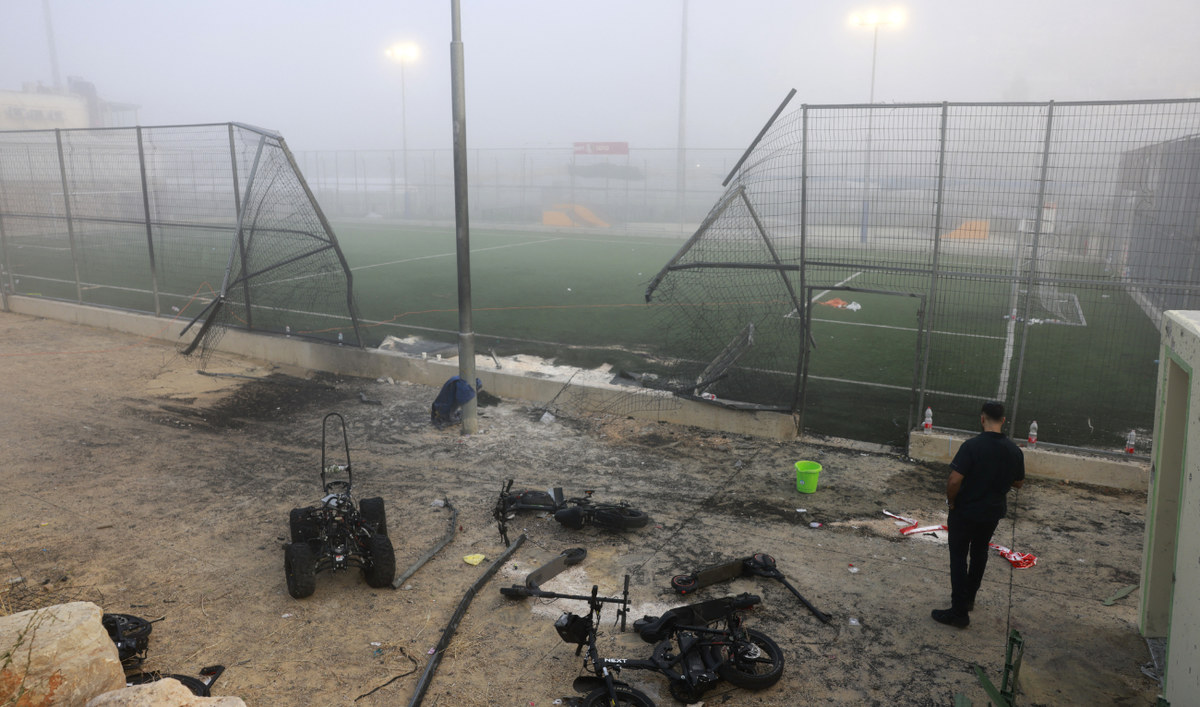
A man stands near a damaged gate around a football pitch after a reported strike from Lebanon fell in Majdal Shams village in the Israeli-annexed Golan area on July 28, 2024. (AFP)
The Majdal Shams incident followed an Israeli strike that killed four Hezbollah fighters in southern Lebanon, prompting the militia to launch retaliatory rocket attacks against the Golan and northern Israel.
In a thread posted on social media platform X, Mohanad Hage Ali, a senior fellow at the Carnegie Middle East Center in Beirut, said one possible scenario is that Hezbollah or one of its allies like the Al-Fajr Forces and the Al-Qassam Brigades fired the rockets by mistake.
Regardless of what took place, “in all cases, the massacre provided the Netanyahu government with an (excuse) to respond with force,” he said.
Netanyahu, who returned from his US visit early, immediately attended a security cabinet meeting, telling local media that “Hezbollah will pay a heavy price” for the attack, “a price it has not paid before.”
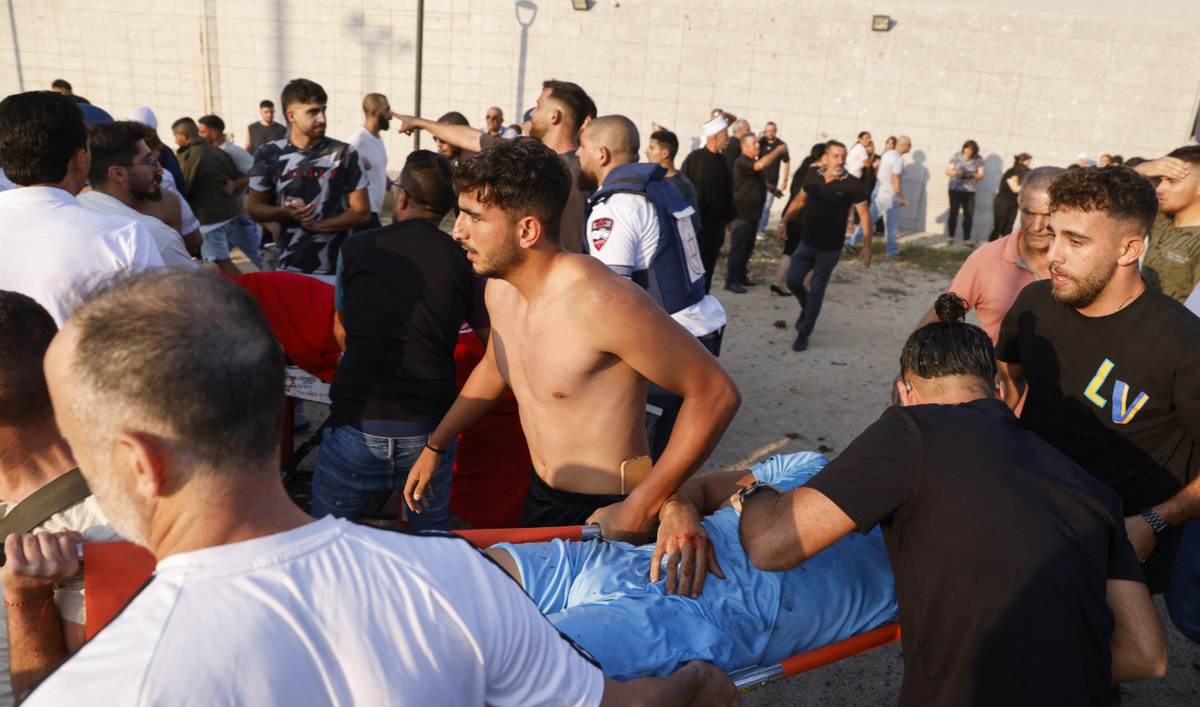
Israeli security forces and medics transport casualties along with local residents in Majdal Shams village in the Israeli-annexed Golan area on July 27, 2024. (AFP)
After the meeting, his office said: “The members of the cabinet authorized the prime minister and the defense minister to decide on the manner and timing of the response against the Hezbollah terrorist organization.”
On Sunday, during a visit to Majdal Shams, Gallant vowed to “hit the enemy hard,” raising fears the war in Gaza could spread. Iran, meanwhile, warned Israel that any new military “adventures” in Lebanon could lead to “unforeseen consequences.”
Israel’s army called it “the deadliest attack on Israeli civilians” since the exchanges of fire across the Lebanese border began in October. The attack has heightened fears that what have been relatively contained hostilities so far could spiral into all-out war.
Indeed, region watchers are fearful that any major retaliation to the attack mounted by Israel could even draw Hezbollah’s Iranian backers into the fray.
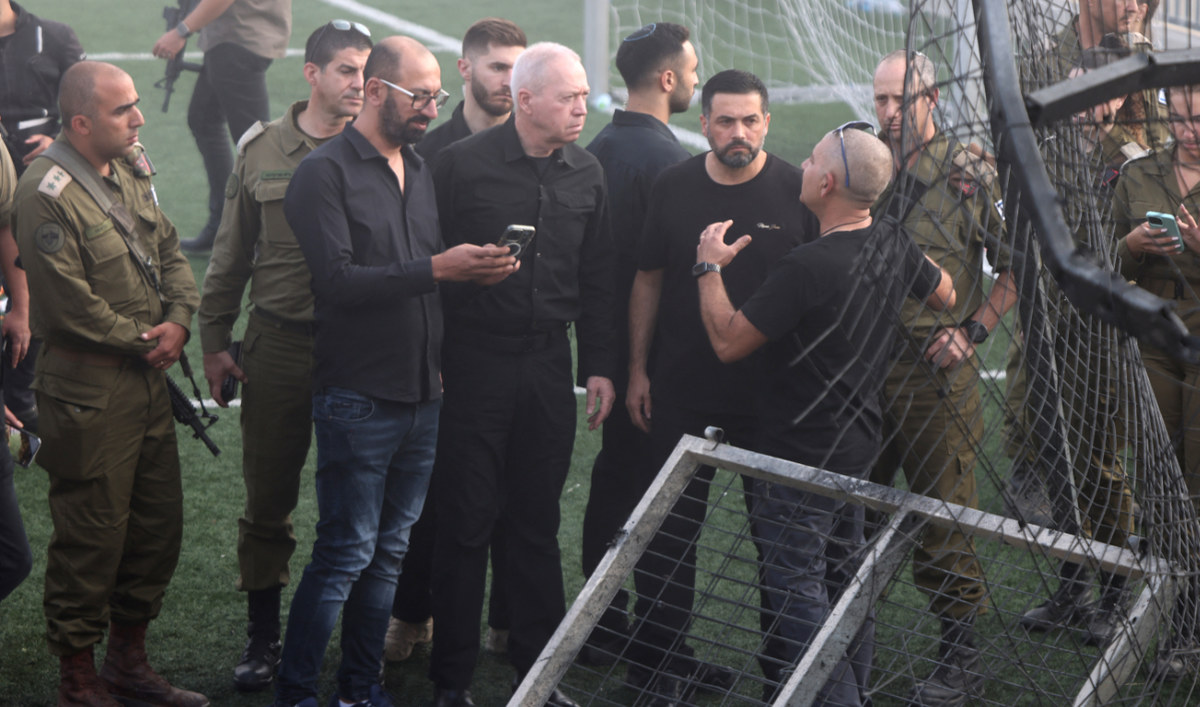
Israeli Minister of Defense Yoav Gallant (C) visits the site where a reported strike from Lebanon fell in Majdal Shams village in the Israeli-annexed Golan on July 28, 2024. (AFP)
“A strong Israeli response against Hezbollah could provoke another direct retaliation from Iran,” Meir Javedanfar, an Iranian-born Israeli Middle East commentator and academic, said following the rocket attack.
As with previous escalatory incidents between Israel and its Iran-backed foes since the Gaza war erupted, retaliatory actions have been relatively minor and carefully orchestrated to maintain their deterrence effect without sparking a major confrontation.
However, Firas Maksad, senior fellow at the Washington D.C.-based Middle East Institute, is under no illusions about the severity of the situation. “The risk of further miscalculation hasn’t been any higher,” he said.
“A broader Israel-Lebanon war has been a long time coming. A ‘positive’ scenario will see the coming offensive contained to the now largely de-populated areas of both countries.”
INNUMBERS
- 12 Children and teenagers killed in Saturday’s rocket attack on Majdal Shams in the Israeli-occupied Golan Heights.
- 527 People killed on the Lebanese side of the border since Israel-Hezbollah exchanges began in October, including at least 104 civilians.
- 46 People killed on the Israeli side — including in the Golan Heights — 22 of them soldiers and 24 of them civilians, according to Israel’s army.
Although the rocket attack and subsequent Israeli retaliation could create the conditions for a rapid escalation, Hage Ali of the Carnegie Middle East Center believes Hezbollah is still eager to avoid an all-out war.
“It remains that Hezbollah wants to avoid a war and would show restraint following the Israeli response,” he said. “Even if Hezbollah crosses a red line, Hezbollah would likely choose a symbolic ‘tick the box’ response.”
However, “the Majdal Shams attack highlights the challenge of sustaining a geographically restricted conflict for many months. Mistakes or miscalculations are bound to happen and could escalate into a conflict, regardless of the various parties’ desire to avoid conflict.”
Opinion
This section contains relevant reference points, placed in (Opinion field)
Israel made good on its threat to retaliate early on Sunday morning by striking the southern Lebanese towns of Abbasiyah and Burj Al-Shamali. Both towns, adjacent to the city of Tyre, sustained significant material damage. Further attacks took place on Tyre Harfa and Khiyam.
Strikes also occurred in Taraya in central Bekaa, with two missiles destroying a residential building. No casualties were reported.

Smoke billows from a site targeted by the Israeli military in the southern Lebanese border village of Kafr Kila on July 29, 2024. (AFP)
“No one wants a big war,” Kim Ghattas, a Lebanese journalist based in Beirut who writes for The Atlantic, posted on X.
“Israel will look to hit key or high visibility targets either in one heavy night of strikes, or a week of ops. The key is to avoid population centers/civilian casualties and not to trigger a big Hezbollah response and a wider war.
“Very difficult to calibrate this. High stakes for Lebanon, region, and the Biden administration. So far Israel has not called to evacuate further settlements in northern Israel, indicating they believe Hezbollah’s response will be measured.
“All this requires open channels of comms to make sure no one mis-reads the other side’s moves. It’s like a choreography of death, with all too real consequences for civilians everywhere.”
As tensions mounted over the weekend, several Western nations issued statements urging their citizens to avoid all unnecessary travel to Lebanon and Israel. Meanwhile, multiple airlines have suspended flights to and from Beirut.
A flurry of diplomatic activity has been underway since the attack to contain Israel’s response.
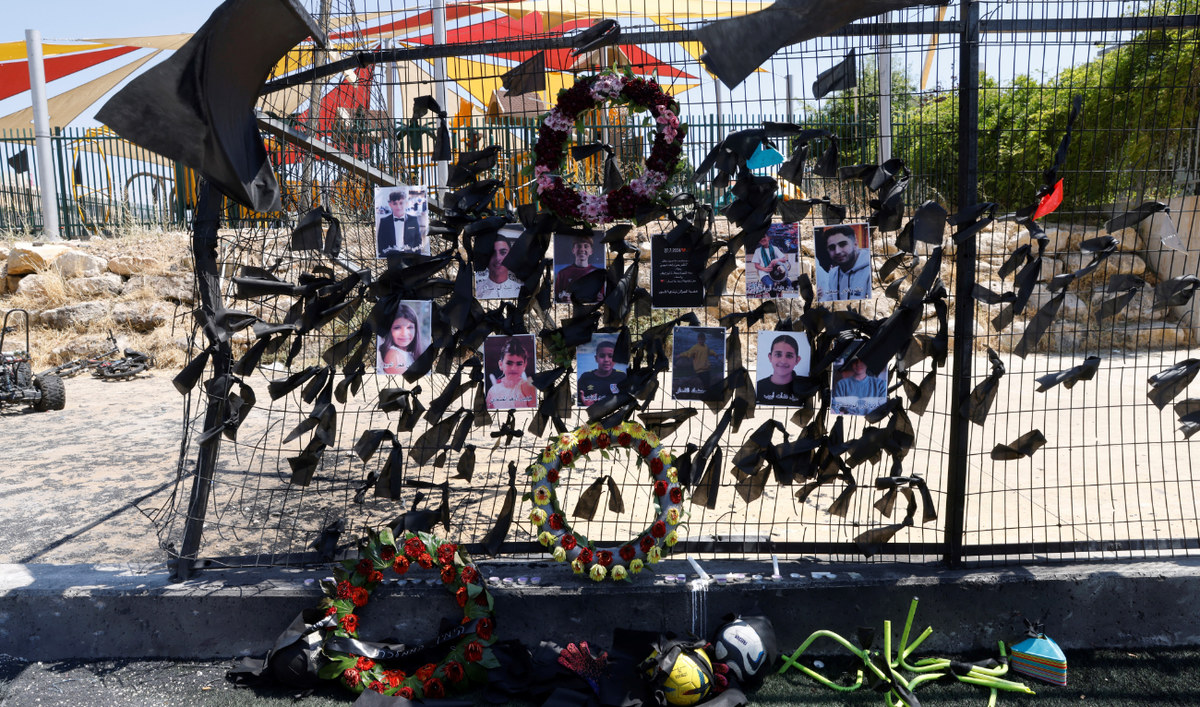
Portraits of the children and youngsters who were killed hang on the football stadium fence where a rocket landed, in the village of Majdal Shams in the Israel annexed Golan on July 29, 2024. (AFP)
The Lebanese government condemned all acts of violence and attacks on civilians. “Targeting civilians is a flagrant violation of international law and contradicts the principles of humanity,” it said in a statement, calling for “an immediate cessation of hostilities on all fronts.”
Lebanese Foreign Minister Abdallah Bou Habib said the US, France and others were trying to contain the escalation, in an interview late Sunday with local broadcaster Al-Jadeed.
“Hezbollah has been targeting military sites, not civilian sites, since the beginning of the war,” he said, adding he did “not believe that it carried out this strike on Majdal Shams.”
“It may have been carried out by other organizations, an Israeli mistake, or even a mistake by Hezbollah. I do not know. We need an international investigation to find out the truth of the matter.”
Lebanese Prime Minister Najib Mikati also said that “talks are ongoing with international, European and Arab sides to protect Lebanon and ward off dangers,” in a statement on Sunday.
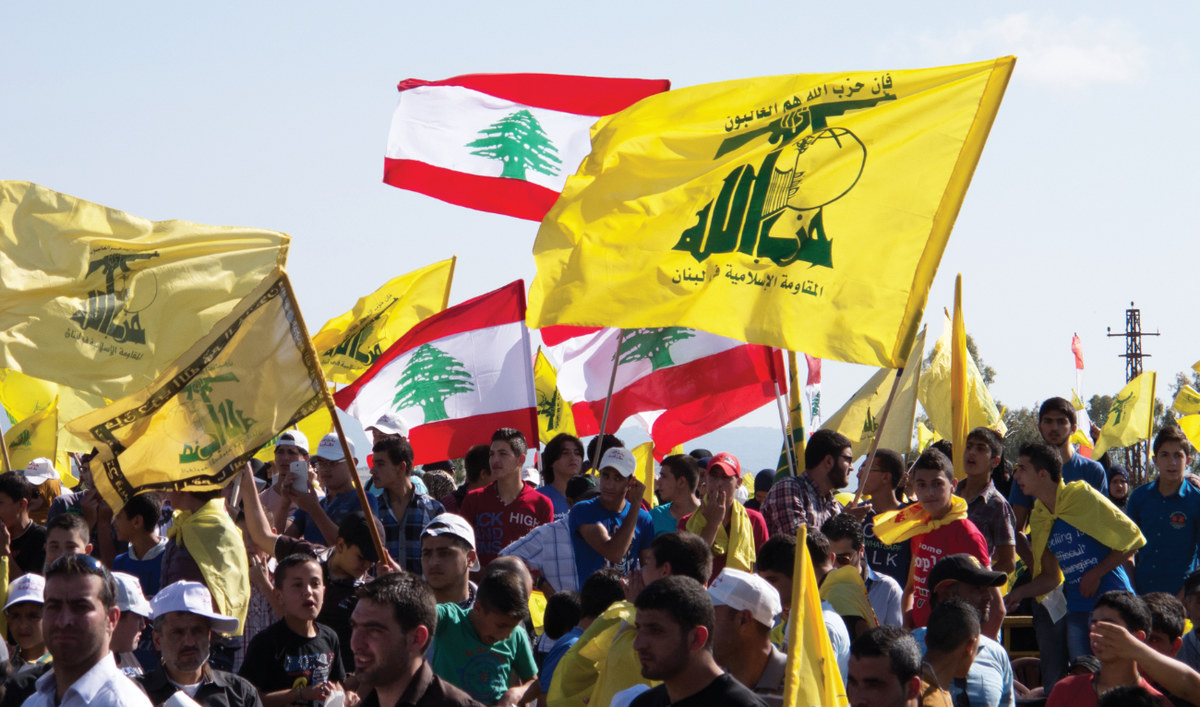
Hezbollah said it had “no connection” to the Majdal Shams strike, but confirmed it had fired one such rocket on Saturday toward an Israeli military target in the Golan. (Shutterstock)
Adrienne Watson, the US National Security Council spokesperson, said Washington has been “in continuous discussions” with Israel and Lebanon since the attack.
Antonio Guterres, the UN secretary-general, condemned the rocket attack and called on all parties to “exercise maximum restraint.”
In a joint statement, Jeanine Hennis-Plasschaert, the UN special coordinator for Lebanon, and Maj. Gen. Aroldo Lazaro, head of the UN Interim Force in Lebanon, stressed that “civilians must be protected at all times.”
They urged “the parties to exercise maximum restraint and put an end to the intense and ongoing exchange of fire that could ignite a wider conflict that would plunge the entire region into an unimaginable catastrophe.”
Hennis-Plasschaert said she had been in contact with Nabih Berri, the speaker of the Lebanese parliament, who is considered an important channel of communication with Hezbollah.
In his own statement, Berri said “Lebanon and its resistance (Hezbollah) are committed to Resolution 1701 and the rules of engagement not to target civilians,” stressing that “the resistance’s denial of what happened in Majdal Shams categorically confirms this commitment and its and Lebanon’s lack of responsibility for what happened.”
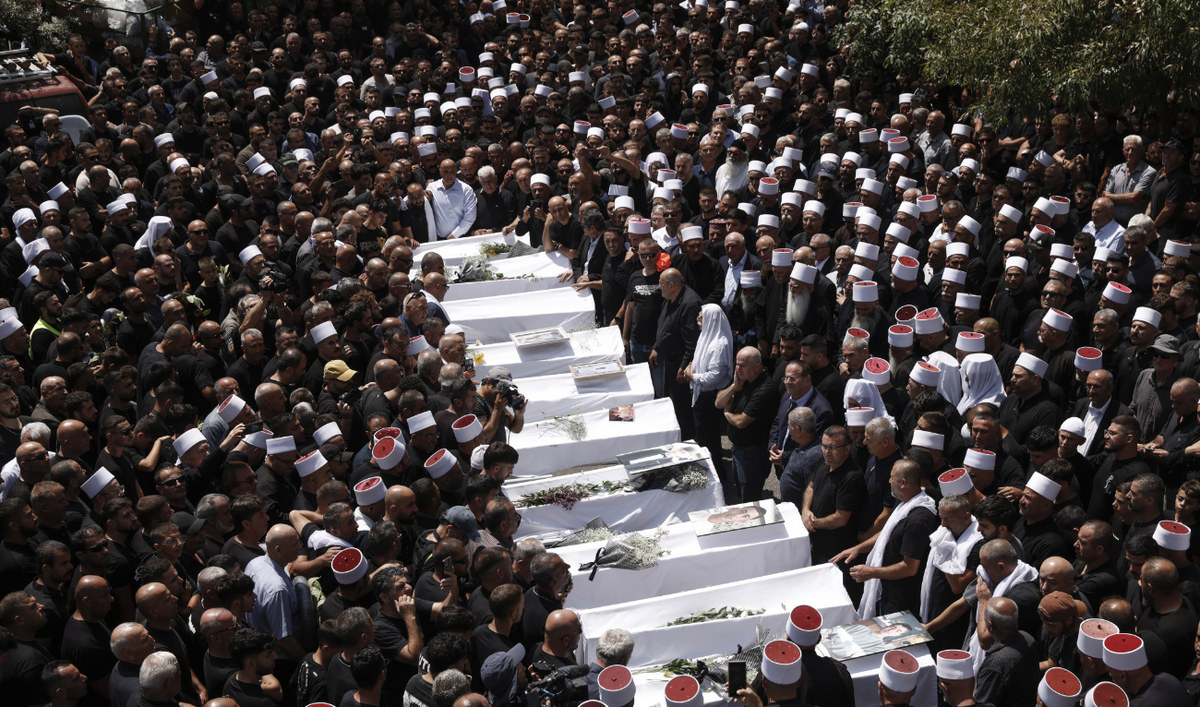
Mourners surround the coffins of 10 of the 12 people killed in Majdal Shams during a mass funeral in the Israel-annexed Golan, on July 28, 2024. (AFP)
Walid Jumblatt, the influential former leader of the Druze-based Progressive Socialist Party, said he had received a phone call on Saturday night from US President Joe Biden’s special envoy Amos Hochstein to discuss the incident.
Jumblatt called on both sides to exercise restraint and to remain calm, reiterating the need to avoid civilian casualties. “Wherever it occurs, the targeting of civilians, whether in occupied Palestine, the occupied Golan, or in southern Lebanon, is unacceptable,” he said in a statement.
The fact that those killed in the Majdal Shams attack were not Israelis but members of the Druze community is a complicating factor for Hezbollah, which has sought to improve ties with the religious sect.
Many residents of Majdal Shams have not accepted Israeli nationality since Israel seized the Golan Heights from Syria in 1967.
Following the conquest of about two-thirds of the Golan plateau during the 1967 Arab-Israeli war, Israel annexed the area in 1981 in a move not recognized by the international community, with the exception of the US since 2019.
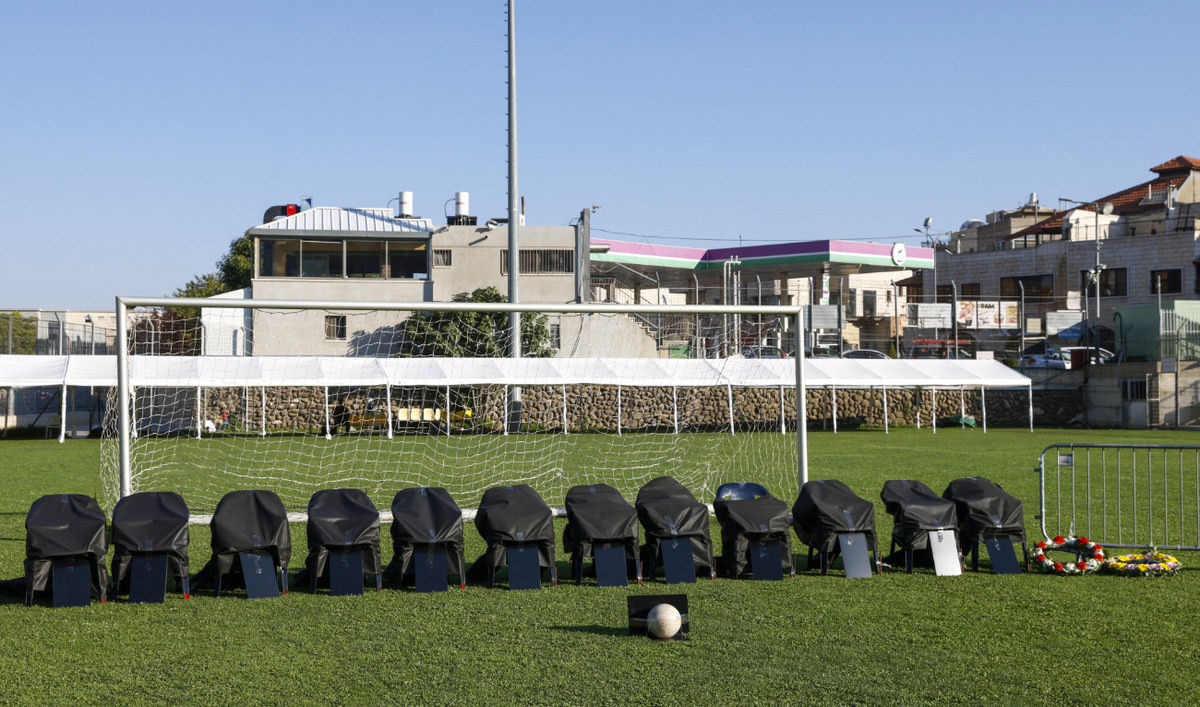
Chairs covered in black representing 12 members of the Druze community killed in a rocket strike from Lebanon, are lined up in the football pitch where the attack took place, during their funeral in Majdal Shams on July 28, 2024. (AFP)
The Golan Druze largely identify as Syrian, while having resident status, rather than citizenship, in Israel. Members of the Druze community in Syria have resisted the Syrian regime of Bashar Assad, which is backed by Hezbollah.
“The ‘casus belli’ of a war is particularly important for Hezbollah,” said Michael A. Horowitz, a geopolitical analyst and head of the analyst team at Le Beck International.
“They will have to justify their actions to the Lebanese (who would suffer massive destruction by Israel) if a war breaks out as a result of the attack in Majdal Shams, and this will be particularly uncomfortable for them.
“Hezbollah wants to be seen as the defender of Lebanon. If a war breaks out over an attack that killed residents of a town (who) don’t even identify as Israelis, this would be particularly bad for the group.
“This explains the Hezbollah denial, on top of the sectarian dynamic. The very narrative of how the war begins is critical for the group.”





























